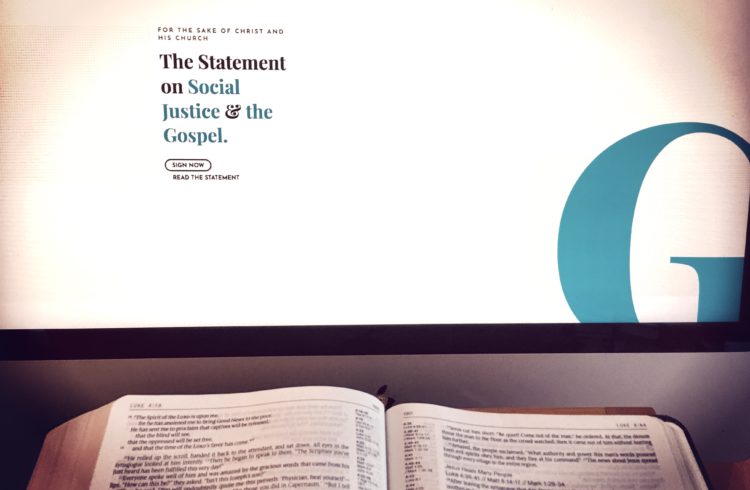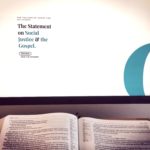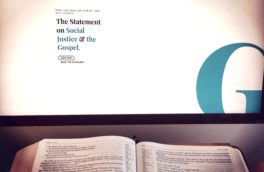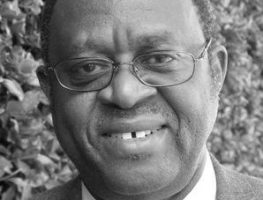This is part 2 of a response to the Statement on Social Justice and the Gospel.
Read part 1 by Dennis Edwards: What’s This Really All About?
When Dennis and I started to craft a response for Missio Alliance regarding the John MacArthur Statement on Social Justice and the Gospel, my first reaction was to be snarky and dismissive. My second reaction was to “out exegete” the Statement with the kind of righteous anger that Jesus showed in the temple.
Then I read Dennis’ thoughts and I began to feel an unease—an unease that manifested itself in backpedaling, but for reasons I couldn’t articulate. Dennis and I continued to bat this around, and finally the reason for my reticence dawned on me: I can’t critique JMac until I first acknowledge that I am JMac.
I am JMac
The truth is I grew up in a white, male-centered evangelical world that was profoundly shaped not only by white patriarchy (the imperfections of which Dennis profoundly exposes in his response), but quite literally by John MacArthur himself. To grow up in American evangelicalism is to swim in the waters of all things white and male. John MacArthur is both an example and an archetype of an ecclesiastical DNA devoted to the voice, perspective, and power of white dudes.
But I am a white dude. A white dude who grew up, and whose faith was formed, in a world made by and for people like me. That means that I have benefitted, and almost certainly literally profited, from the very cultural moment I signed up to critique.
So, there it is. I am JMac. I don’t know him personally and I’m sure he’s a fine fellow to grab a beer, or coffee probably, with. But the critique that Dennis leveled against the statement on social justice bearing his name rings true of my experience: the evangelical movement has been controlled by white men who do seem to have an affinity with producing statements to protect our ideological borders. And the more I thought about what I wanted to say in response, the more I felt the instinct kick in to issue a theological edict to counter the MacArthur statement.
But white men issuing edicts that counter other edicts offered by other white men will get us nowhere. Nowhere. I'd like to issue a theological edict to counter John MacArthur's statement, but white men issuing edicts that counter other edicts offered by other white men will get us nowhere. Click To Tweet
“Woe is Me.”
I can’t escape the experience of the biblical prophet Isaiah in Isaiah 6:5 when, after having a genuine encounter with the Lord, his first response is to say: Woe is me.
Before he acknowledges that he lives among an unclean people, he acknowledges the woe that accompanies his own realization of complicity in the sin of his people.
This entire episode precedes his calling into the role of prophet which has been instructive for me as I have spent the last few years deeply engaged in justice-oriented ministry. Isaiah moves from a spiritual encounter (could we say he gets woke?) to deep sorrow for his sin and his corporate complicity as he owns the cultural sin of his people’s way of life in the world. All of this happens before, and informs, the posture he takes as he (with great reticence and trepidation) steps into the role of prophet for the people.
Isaiah seems to be showing us that genuine wokeness provokes 1) confession and 2) submission to cleansing.
He does not jump immediately from wokeness to prophet because to do so would miss the point of the entire experience. And when he finally does take up the mantle of prophet, he does so with knees knocking—a humility that seems to derive from his keen awareness of the hypocrisy that imbues his very words. But it is this Isaiah that leaves a deep imprint on our collective imagination around justice.
My confession is that I ALWAYS want to jump from awakening to prophet. I want to turn from the moment of revelation and rush into the work of lecturing and teaching and defining for others. I want to shirk my shortcomings and manufacture an image as someone who really “gets it.”
I guess those desires shouldn’t surprise me because I have been shaped by the values and ethics of a white, male, evangelical world. That my edict/statement/position paper/sermon series represents a more progressive theological or political disposition does not erase the fact that my impulse to define and control orthodoxy reveals that I am still trafficking in the power afforded me by a white and male-dominated culture. When I draw the line in the sand for everyone else to deal with (“Get on board or get off the train!”), I reveal my blindness to my own privilege.
I’m learning to recognize my instinct to teach others, create position papers, guard my version of theological orthodoxy, and define theological faithfulness for others. I own this is a privileged move for someone uncomfortable with losing the cultural position of power. What I want to write off as a conservative tendency is actually something much deeper, a fundamentalism that shows up in my conservative AND progressive sensibilities, as well as relational circles.
Instead of Throwing Stones, I Confess
So, in the end, rather than write a response to JMac, I just want to affirm Dennis’ response and, inviting us to submit ourselves to the voices of leaders like Dennis, confess my complicity and participation in a world in which these kinds of reductionist and marginalizing statements are commonplace.
I confess that I participate in, and benefit from, a church world that looks to white men to define orthodoxy (whether conservative or progressive forms) and that I do not know the extent of my blindness to its power.
I confess that I (even without trying, or wanting to) exoticize the contributions of non white/male theological streams and, in so doing, relegate faithful voices to the ecclesial margin.
I confess that I, even today, want to be the arbiter of good theology, especially as it relates to issues of justice without submitting to the painfully cleansing work of God (often through the people of God).
I confess that, too often, I am the socially woke Pharisee that is looking for a way to drop a justice hot take on the unsuspecting and sleepy evangelical. I wanted to drop the mic on this statement and expose its narrowness as an example of missing the heart of God. But that work—without the confession work accompanying it—usually works to distance me from my communal complicity in the breakdown of God’s shalom.
I am hopeful that we folks of the lighter hue will find our way beyond the desire to define and control. My fear is that we will just trade conservative expressions of this instinct for more justice-oriented ones, that we will play the same power chord with a different instrument. But perhaps if we join the prophet Isaiah in a genuine awakening that leads to a posture of confession and a submission to our own (not someone else’s) cleansing, we will find a way forward. I confess that I participate in, and benefit from, a church world that looks to white men to define orthodoxy (whether conservative or progressive forms) and that I do not know the extent of my blindness to its power. Click To Tweet
I’m Still Learning
I don’t know if white evangelicalism needs more statements…but we do need to wade in the waters of more diverse streams, and we need to submit ourselves to their historic, embodied faithfulness. At least, that’s true for me.
One of the great gifts from God in my life is the presence of extraordinarily grace-filled sisters and brothers, who haven’t benefited from white male evangelical culture, who have journeyed with me and who help me identify my sin and my complicity in the sins of my people. People like Dennis, Juliet, Manny, Brandon, Michelle, Cecilia, John, Dominique, Grace, Safwat, Drew, Rich, Andrew, John, Becky, Al, Malcolm, Lawrence, Robert, Peter, Theo, and scores of others who have had compassion on me as one like a sheep without a shepherd. I will always need their presence in my life to see clearly enough to offer something of myself to God and the kingdom God is bringing to bear in the world through Jesus. I cannot hope to participate faithfully in the incredible mosaic of the kingdom of God without such faithful friends, co-laborers, and guides.






Missio Alliance Comment Policy
The Missio Alliance Writing Collectives exist as a ministry of writing to resource theological practitioners for mission. From our Leading Voices to our regular Writing Team and those invited to publish with us as Community Voices, we are creating a space for thoughtful engagement of critical issues and questions facing the North American Church in God’s mission. This sort of thoughtful engagement is something that we seek to engender not only in our publishing, but in conversations that unfold as a result in the comment section of our articles.
Unfortunately, because of the relational distance introduced by online communication, “thoughtful engagement” and “comment sections” seldom go hand in hand. At the same time, censorship of comments by those who disagree with points made by authors, whose anger or limited perspective taints their words, or who simply feel the need to express their own opinion on a topic without any meaningful engagement with the article or comment in question can mask an important window into the true state of Christian discourse. As such, Missio Alliance sets forth the following suggestions for those who wish to engage in conversation around our writing:
1. Seek to understand the author’s intent.
If you disagree with something the an author said, consider framing your response as, “I hear you as saying _________. Am I understanding you correctly? If so, here’s why I disagree. _____________.
2. Seek to make your own voice heard.
We deeply desire and value the voice and perspective of our readers. However you may react to an article we publish or a fellow commenter, we encourage you to set forth that reaction is the most constructive way possible. Use your voice and perspective to move conversation forward rather than shut it down.
3. Share your story.
One of our favorite tenants is that “an enemy is someone whose story we haven’t heard.” Very often disagreements and rants are the result of people talking past rather than to one another. Everyone’s perspective is intimately bound up with their own stories – their contexts and experiences. We encourage you to couch your comments in whatever aspect of your own story might help others understand where you are coming from.
In view of those suggestions for shaping conversation on our site and in an effort to curate a hospitable space of open conversation, Missio Alliance may delete comments and/or ban users who show no regard for constructive engagement, especially those whose comments are easily construed as trolling, threatening, or abusive.